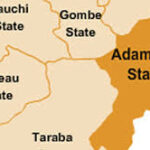
Praises flowed yesterday as Professor Sambo Wali Junaidu was installed as the 13th Wazirin Sokoto in a ceremony at the Palace of the Sultan.
The Emir of Gwandu, Muhammad Iliyasu Bashar, made a symbolic transfer of the royal regalia to the new Waziri as was done by his forefather, Malam Abdallahin Gwandu, who was said to be the first Wazirin Sokoto before founding the Gwandu Emirate.
Malam Abdullahin Gwandu who was a younger brother of Sheikh Usman bin Fodiyo and his Waziri was said to have removed his regalia and put on Waziri Gidado as a sign of loyalty and respect during the reign of Sultan Muhammad Bello.
After the turbanning, the Emir of Gwandu urged Professor Junaidu to be respectful, honest and obedient to the Sultan, saying this was how his predecessors succeeded. He urged him to use his new office to protect the image of the caliphate.
Alhaji Bashar also advised Nigerians to remain prayerful and obedient to their leaders, saying being disrespectful to them would not augur well with the wellbeing of the nation.
Sultan Muhammadu Sa’ad Abubakar III described the new Waziri as highly experienced and knowledgeable who is conversant with their activities. He assured him of his support to succeed in his new office, adding that they would work together to promote Islam and unity of the Ummah and Nigeria.
The position of Wazirin Sokoto became vacant with the death of late Alhaji Usman Junaidu on October 20, 2017. The graduate of Al-Azhar University of Egypt, the late Waziri who was the elder brother of Professor Sambo was installed in 2007 after the demised of their father, a renowned Islamic scholar, Waziri Junaidu. Among the students of their late father was Sheikh Abubakar Mahmud Gummi of blessed memory.
Like his late brother, the new Waziri was also an academic who spent all his working life teaching and researching in the fields of Arabic and Islamic studies. He has many books to his credit and before his appointment he had been handling assignments for the Sultanate Council as chairman, Advisory Committee on Religious Affairs to the Sultan.
Born in 1947, the new Waziri began his teaching career with a Grade II teacher’s certificate and later obtained NCE certificate at the defunct Advanced Teachers’ College (ATC), Zaria after which he proceeded to Ahmadu Bello University and obtained B.A in Education in 1975. He obtained Master degree in Arabic in Khartoum, Sudan in 1979 and Ph.D in London in 1985.
He held several positions within the academic, state and national levels. He was Dean of postgraduate school, Director, Centre for Islamic Studies, Usmanu Danfodiyo University, Sokoto, (UDUS) and visiting Professor, University of Maiduguri. He was the chairman, Organizing Committee, Sultan Ibrahim Dasuki Installation Seminar in 1989, President, Nigeria Association of Teachers of Arabic and Islamic Studies between 1995 and 1998. He also published over 30 books.
However, before the announcement of the successor to the late Usman Junaidu there was what many people called as “unusual delay” leading to speculations that there was disagreement at the Sultanate Council on who among the aspirants should be recommended for the state government. Daily Trust on Sunday learnt that there were about ten people aspiring for the position as a result of which people believed that there was a rift.
Commenting in the delay, the new Waziri told Daily Trust on Sunday that “naturally, one would feel worried and probably one would not feel at ease, especially with so many competing for the same post. But as Muslims, we should know that Allah, the Almighty is in full control. There is nothing whether big or small that can happen without the acceptance of the Almighty Allah. So, even when I feel worried, I quickly revert to destiny. If Allah says this should happen this year or next year or 100 years to come it would follow that course until the ultimate time which only Allah knows when it would take place.”
The function of the Waziri in the caliphate is key in the daily administration of the people. In fact, he is the chief administrator or a Prime Minister in the case of a parliamentary system.
According to Professor Junaidu “The Waziri is the Prime Minister of the Head of State or President. In this case the Sultan. As the time goes on, the division of administration came under the tutelage of the bursar. Also anything that has connection with the religion, religious affairs are also the responsibilities of the Waziri.
During colonial days, he said Waziri was also in charge of the taxes that were collected and deposited into the treasury and has the power to depose an emir or take an administrative decision on behalf of the Sultan.
Besides, professor Junaidu pointed out that there were instances when the Waziri can go as far as Adamawa, Kano and take administrative position as if the Sultan is present because he is representing the Sultan. “There are instances, when some Emirs were deposed and new ones appointed and Waziri just came and informed the Sultan that he had taken administrative action. So he has the full power like that of a Prime Minister in a civilian government,” he added.
The new Waziri said he was determined to revive the Islamic school initiated by his father. He also advised Nigerians to work together irrespective of their differences, saying God knows best why he cemented Nigeria into one nation otherwise he would have fragmented it into smaller fractions. “I think we should utilize what unite us rather than emphasize on our differences,” he advised.
The former Public Relations Officer of the Sultanate Council, Malam Abubakar Umar, described Professor Junaidu as a combination of universality and local relevance and therefore in a good position to counsel the Sultan on issues that are even well beyond his duties as Waziri.
He said his appointment had assisted in maintaining the needed intellectual character of the Wazirate, when viewed against the backdrop of the intellectual giants that had occupied the position since the first Waziri.
He stressed the need for the Sultan and Waziri to bridge their world views, as it is obvious that they have very different backgrounds but need to streamline their approaches even though they are expert in their various areas of callings. He said as much as possible, the Sultan should listen to and strongly consider positions held by the Waziri and view him as a fountain of knowledge of which many things are bound to be gained.

 Join Daily Trust WhatsApp Community For Quick Access To News and Happenings Around You.
Join Daily Trust WhatsApp Community For Quick Access To News and Happenings Around You.


